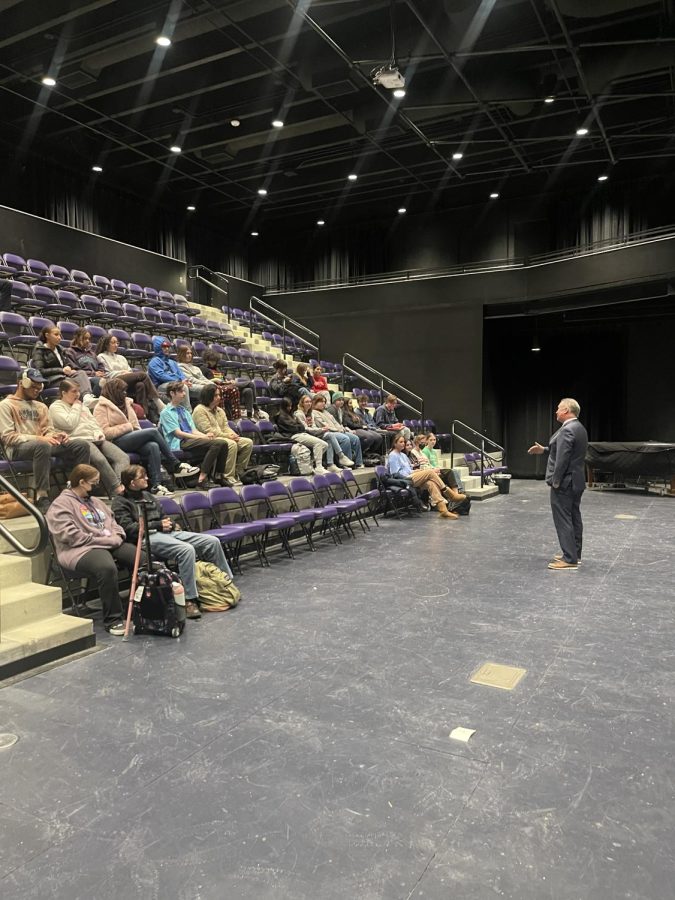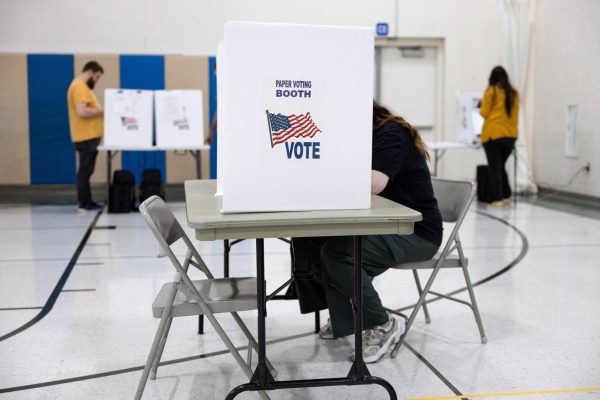Rep. Don Bacon visits Central, speaks on finance
US Rep. Don Bacon visited Central as a part of the Capitol Hill Investment Challenge. On Feb. 23, Rep. Bacon spoke to a group of students in the Blackbox theater regarding economic responsibility.
The Capitol Hill Investment Challenge is a simulation taken on by Andrew Ruchti’s government class. The Challenge gives students a hypothetical $100,000 to invest in portfolios, stocks and bonds to help young people learn about financial markets.
“I don’t claim to be a brilliant guy on this, but I’ll tell you what I’m doing and I hope they do better than me,” Bacon said. “[Investing] is one of the core life skills people can have, and very few people who come out of high school have them right now.”
Bacon described several strategies on how to be smart with finances. He advised students to be selective on their choice of education after high school and said people in trade positions made upwards of six digits because of shortages of welders, truck drivers, electricians and plumbers.
Bacon also strongly advised people against taking on debt. “Know the hole you’re jumping into with debt,” he said.
After giving advice, Rep. Bacon fielded questions from students in attendance. The Register asked Rep. Bacon about the ongoing debt limit standoff, and what he was planning to do to address it.
“The federal debt crisis is, in my view, a crisis. I think very few people – even in Congress – understand the scope of what it’s going to take to fix it,” Bacon said. “A lot of people think that this is mainly discretionary funding,” i.e., funding at the government’s discretion, “but a third of our funding is discretionary.”
Bacon talked about mandatory government funding, which he said are “promises” that the country has made like social security, the Department of Defense–which controls the military–Medicare and Medicaid. The Treasury reported that Social Security is the largest part of the government budget, followed by “Health, Income Security and Defense.” The other part of the budget Bacon touched on was the discretionary budget and Bacon said the returns on the discretionary spending the government authorized were much higher than that of the mandatory spending.
Bacon suggested that the Congress re-inspect its mandatory budget and make changes to cut what he called unnecessary spending.
The US debt has reached a record-breaking $31.4 trillion, over the limit it has set for itself, and economists expect it to grow by $20 trillion more by 2033, according to the Congressional Budget Office. If the US continues not to raise its debt limit, the country could default on its debts and stop all debt payments, which would cause a hike in interest rates bound to increase unemployment and inflation. Dr. Ernie Goss, economist at Creighton University, said that the US defaulting on its debt would be a “calamity.”
Republicans in Congress are refusing to raise the debt limit unless Democrats agree to cuts in spending, but the Biden administration has said that it will not take part in policy organizations surrounding the debt ceiling hike.
After addressing students, Rep. Bacon said that he enjoyed being at Central.
“[Central] is gorgeous,” Rep. Bacon said. “It’s one of the most pretty schools we have in the area.”
Your donation will support the student journalists of Omaha Central High School. Your contribution will allow us to purchase equipment and cover our annual website hosting costs.

Hi! My name is Charlie (he/him), and I'm a senior. This is my fourth (and final </3) year on staff, and I’m the Co-Editor-in-Chief. I was voted most...



















